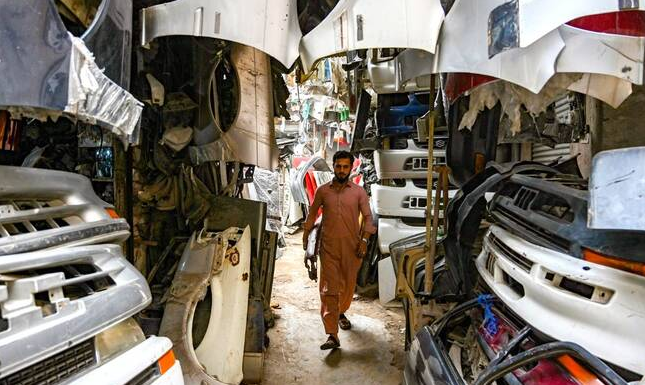In Karachi, auto parts manufacturers in Pakistan are sounding alarms about potential shutdowns triggered by imminent government reforms tied to an International Monetary Fund (IMF) bailout. These reforms include slashing import tariffs to 15 percent and opening the floodgates for used car imports without age restrictions—a move industry insiders say could devastate local production.
The Pakistani government, led by Prime Minister Shehbaz Sharif, aims to boost the country’s fragile economy by 4.2 percent during the current fiscal year, leaning heavily on the IMF’s $7 billion support package. However, the IMF’s stringent conditions have compelled the government to liberalize trade policies, particularly in the automobile sector, which local manufacturers warn could backfire.
Aamir Allawala, former chairman and current key member of the Pakistan Association of Automotive Parts & Accessories Manufacturers (PAAPAM), expressed deep concern. He highlighted that the reforms—if implemented as planned—risk shutting down about 1,200 firms that supply critical components like steel, rubber, aluminum, and plastic parts to major auto assemblers including Toyota, Honda, Suzuki, Hyundai, Kia, and Changan.
“We’re seeing decisions that could fundamentally reshape the industry,” said Allawala, CEO of Techno Auto Glass Ltd., a supplier for leading automakers. “Removing age limits on used car imports and drastically reducing import duties will create an uneven playing field, damaging local manufacturers who already struggle with low demand.”
Currently, Pakistan’s car parts manufacturers are operating well below capacity. Techno Auto Glass’s plant at Port Qasim, valued at over Rs4 billion ($15 million), is functioning at just 20 percent capacity, producing 10,000 glass units a month—far less than its full potential. Similar stories emerged from other factories visited by Arab News, such as Aisha Steel Mills and Agriauto Stamping Company, all grappling with reduced production due to declining demand.
Muhammad Umer Razzaq from Thal Boshuku Pakistan shared that while his plant can manufacture auto seat sets for 54,000 vehicles annually, it is currently supplying only 18,000 sets. Likewise, Agriauto Stamping’s CEO Faheem Kapadia reported producing parts for 130,000 cars annually against a capacity of 300,000.
Pakistan’s auto market has suffered steep declines amid economic instability. Inflation reached a historic 38 percent in May 2023, severely cutting purchasing power. The World Bank recently reported nearly half the population lives below the poverty line. New car sales have dropped by over 50 percent in three years, with only 111,402 units sold up to June, according to Pakistan Automotive Manufacturers Association data.
Allawala attributes the slump not just to economic factors but also heavy taxation, with buyers facing up to 45 percent tax on new vehicles. “The auto parts sector has invested hundreds of billions of rupees and employs around 500,000 skilled workers directly, with total employment across the industry nearing 2.5 million,” he noted. “We fear job losses on a massive scale if these reforms proceed without adjustments.”
The government’s May decision to reduce import tariffs significantly—bringing them down from as high as 100 percent to a uniform 15 percent—stands in sharp contrast to policies in other car-producing countries. For example, India maintains a 125 percent tariff on imported cars, while Thailand, Indonesia, and Vietnam impose tariffs ranging from 52 to 80 percent to protect their domestic industries.
“No major car-making country allows unrestricted imports of used cars,” Allawala said. “Pakistan’s sudden tariff cuts and removal of age limits on imports risk undermining a domestic industry that still has potential to grow if supported.”
PAAPAM has formally requested a fact-finding mission from the commerce ministry to better assess the impact of these policies, but as of now, they have received no response.
As Pakistan navigates the difficult path of economic reform, balancing the IMF’s demands with protecting its nascent auto industry remains a critical challenge. Without careful calibration, the reforms meant to stimulate growth could instead lead to significant industrial contraction and job losses in a sector vital to the country’s economic fabric.
